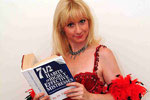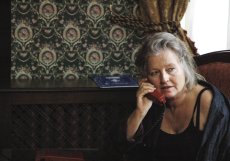Ellen and Jim Have a Blog, Too
We are two part-time academics. Ellen teaches in the English department and Jim in the IT program at George Mason University.


Summer theatre & books: Wolf Trap, Fringe Festival, _The Edge of Heaven_ & _Une Vieille Maitresse_, not to omit _Jenny Wren_ & _Truly, Madly, _Deeply_ · 27 July 08
Dear Friends,
The summer is slipping by. Today I realized I may have to prepare my syllabus for next fall next week in order to go away for a week and get the syllabus into the secretaries on time for xeroxing. I’ve read a highly original rewrite of a Jane Austen novel by E. H. Young, Jenny Wren, which I enjoyed immensely,. The Admiral, Yvette and I have gone to a number of plays & musical events, & Yvette and I to the startlingly persuasive Turkish film, The Edge of Heaven. For Trollope-l, I’m still listening to a Prunella Scales’s wonderful reading aloud of a great masterpiece of a novel, Elizabeth Gaskell’s Wives & Daughters; for Eighteenth Century Worlds, reading Stella Tillyard’s Aristocrats: Caroline, Emily, Louisa, and Sarah Lennox, 1740-1832 and Illustrated Companion. We ended a really satisfying discussion on Women Writers of Christa Wolf’s Cassandra and Medea this past week. And I’ve not recorded any of this.
I’ll start with theatre.
Champagne Sundays from the DC Fringe Festival
7 and 1/2 Habits of Highly Effective Mistresses, also the DC Fringe Festival
We’ve been to Wolf Trap twice thus far: once to listen to Lyle Lovett and his large band; a second time to hear the National Symphony orchestra play Leonard Bernstein’s Candide while some professional opera singers sang in concert. For the Lyle Lovett, we enjoyed a beautiful picnic supper in a wooded area on a blessedly fresh summer’s night. Alas, the music was no where as good. For the second time we went to see Lovett he produced a blah concert: too loud, not sufficiently varied, and banal. He is much better on CD. The enjoyment was the beautiful place, the summer’s night.
It rained hard the evening Candide was performed so we ate at home; the crowd was much thinner and we were seated well within the theatre. Jason Alexander who played Seinfield was Voltaire/Pangloss our master of ceremonies and teacher—as in so many 18th century novels, we are taught explicitly by a teacher in this adaptation; Anne Carolyn Bird (a strong and pretty coloratura soprano) was Cunegonde and her renditions of “Glitter and be Gay,” and the final sentimental moving song about cultivating one’s garden with a few friends with Dominic Armstrong (tenor) as Candide was magificent. The satire was turned into a combination of light opera, musical and satiric showmanship opera; the way it’s done is not at all realistic (as how could it be unless you spent millions and milloins on a many hour movie) so a concert performance was appropriate. The jokes were made contemporary with references to Bush, Cheney and modern day fanatical religion, nationalism and war. Lots of opportunities for parallels were not missed. On the way home Yvette (who has a good memory) compared what we saw to Voltaire and she thought the adaptation somewhat faithful to the more lighter aspects of Voltaire’s satire.
We bought tickets for 5 plays performed as part of the DC Capital Fringe festival. I half-regret that we didn’t chose more musical events and lighter sheerly entertaining fare, but we didn’t feel attracted to the way most of the plays and music were advertised (hard metal rock seemed to be favored). Many of the plays seeed to be straining for high-minded political content and/or were crude, violent, burlesque, with bizarre characters and stories. So we went to 3 classics: an hour and one-half (so abridged) version of Shakespeare’s Coriolanus, a full performance of Peter Weiss’s Marat/Sade, and Harold Pinter’s One for the Road. All three were intelligently and effectively done. We thought it remarkable how relevant Coriolanus is to us today (the Admiral and I had seen a remarkable production by the RSA at Kennedy Center last years. The Admiral felt Marat/Sade has not at all aged. I saw it as a movie in the 1970s and Glenda Jackson’s performance as Charlotte Corday is still in my memory so extraordinary was she. One for the Road seems to be a play centering on a cruel interrogator who bullies, mocks, & scorns the man, woman, and child of a family who the head of the state deems his enemies: the man is traumatized and half-crazed from his treatment; the woman has been humiliated and then raped & is in a state of extreme distress; the child remains calm as yet.
We did manage some cheering fare. Thomas Stephens’s Champagne Sundays brought before the audience two retired couples living in Florida; the male of one has just died. It was almost as if you were watching Noel Coward’s two couples from Private Lives forty years on. They were unfaithful with the opposite spouse, but they did remain with the partner they had chosen, and by the end of the piece, all, including the ghost of the dead man are sitting on a blanket on the beach waiting for the warmth of the sun. We went to see a 2 woman show called 7 1/2 Habits of Highly Effecive Mistresses. I had been attracted to the title since an adjunct colleague actually assigns 7 1/2 Habits of Highly Effective People to his classes, and the Admiral assured me the language the performer used did eacho and allude to this apparently best-selling guru book. Two women (one on a piano) worked hard to amuse us.
Going to the various theaters was interesting. We found ourselves in neighborhoods in DC we’d not been in before: we were in gentrifying, newly professional, up-and-coming, Times Square type, and very poor (and nearby dangerous) places too. Still we had a better time last year and next year must try for some more fun type events.
************
Turning to movies, Yvette and I have seen two remarkable films. First up: The Edge of Heaven, a film so well-done its important content must not be allowed to be erased as I noticed it has in a couple of online mainstream reviews.
Aytel (Nurgül Yesilçay) and Lotte (Patrycia Ziolkowska) reach out to one another in a prison room, The Edge of Heaven
Susanne Staub (Hanna Schygulla) Lotte’s mother grieves on the phone as she tries to reach someone who has some information about where her daughter lived while in Istanbul, The Edge of Heaven
Here is the story. Ali, an aging ill-tempered German man invites Yeter, a prostitute, to come live with him; he murders her in a fit of arrogant disdain when he thought she would just go to bed with him at will; Ali’s son, Negat, a professor of German literature, goes hunting for Ayten, the prostitute’s daughter in Istanbul, & opens a bookshop there. Ayten, who we see next, is a terrorist and saved from brutal police first by a lesbian young woman, Lotte, and then by Susanne, Lotte’s mother after Lotte is also carelessly murdered trying to get a dangerous gun back to Ayten, now in prison perhaps for 20 years in a place which includes murderous terrorists who will kill her if she doesn’t tow a line. Susanne had come to the bookshop since Lotte had rented a place to sleep from the German professor turned bookseller as Susanne, Lotte’s mother, wants to sleep in Lotte’s bed. Negat takes down the sign which would have informed Ayten he knows what happened to her mother, but we are to surmize eventually she will learn this as Susanne is now helping out at the shop and has with her money managed to free Ayten. The last scene shows Negat returned to Germany to make up with his father, to forgive him.
I read the two professional reviews and the two comments on one of them. I agree with one of the comments that it’s astonishing how the professional reviewers erase or displace the politics. It is of intense importance that Ayten is a terrorist; much that happens depends on that, and this film is an excoriating exposee of the cruelty, brutality and indifference of people working for the state and the terrorists too. It is ultimately I think very conservative in its locating compassion and the one security you can have in a mother’s loyal love to her daughter, though it was that mother who understandably threw the daughter out.
The two reviewers also suggest the film is optimistic. One comment shows the writer to be male and angryy because the young male in this film is not macho and “proactive.” He is bitter that the egregious macho male caricatures have taken over and all we have left is bookish gentle males. He forgets the hard mean nasty father—not exactly a caricature though my language is not nuanced. But it’s not optimistic. It is gentle and ends on forgiveness by a mother (of the terrorist who was led to her daughter’s death—the daughter very naive) and son (the bookshop owner ex professor), but that’s because the mother needs someone and the son knows his father is near death and is himself secure from the father’s, he is independent.
The Edge of Heaven is an important film for its take on the political cliques in power in most countries today, their vicious underlings, and the brutal militarism which supports all such regimes. It’s important for its yearnings to forgive and find consoling love.
Then today we saw the French answer to BBC costume drama: a film adaptation by Catherine Breillat’s of Barbey d’Aurevilly’s _Une vieille maitresse. Some remarkable images are here
In the US it’s titled_The Last Mistress_ but is more correctly translated “An old mistress” (Une vieille maitresse is the French title). It’s a remarkable film: it moves very slowly and at first you may get restless, but if you give it a chance, it will suck you into its intensities and irrationalities. The atmosphere is of a bizzare and exaggerated development of erotic enthrallment after an initial murderous hatred between two lovers, the hero, Ryno de Marigny (played by Fu’ad ait Aattou who really looks like one of these dandies in illustrations from the 1830s), a sort of development of Barbey himself blended with Valmont, Lovelace, and a century of Chevaliers (from Manon) and the anti-heroine, Vellini (Asia Argento). We trace the various stages of their madness through flashbacks as Ryno tells his story to the grandmother, La marquise de Flers (Claude Sarraute) of an innocent girl, Hermangarde (caricatured by her visual appearance, your blue-eyed blonde voluptuous innocent who is obedient to all, supervirtuous, Roxanne Mesquida chosen for her looks too).
I thought the film adaptation was a success in the way of apparently faithful ones of English 19th century novels. There was a translation of the madness. You could not have had such a movie done 30 years ago. There were scenes of totally nude love-making with all sorts of athletic poses while having sexual intercourse.
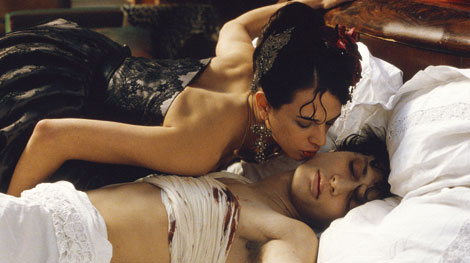
One of the chaster pictures of love-making. Ryno (Fu’ad ait Aattou) has just been shot and we have witnessed close up the ghastly pulling out of a bullet from his body, and Vellini (Asia Argento) is allured by him because of his pain and the blood
At one point Ryno and Vellini go to the desert, have a child and a scorpion kills the child. Vellini grieves extravagantly and won’t bury her so we watch the corpse rot until Ryno buries and sets a pyre over it. And then in the middle of the raving mad fantasy the mother goes mad.
The manners of everyone all the while are exquiste, the photography is exquisite, the costumes a caricature in effect of costume drama but right for the type novel. It’s as if the French said, move over BBC/WBGH, we have a load of books no one has dared to translate and we are going to do it in the French way—for the dialogue is very subtle and intense and slow moving, super subtle over the psychologies of the different characters. There are many references to the 18th century: the grandmother says she is left over; this reminds me of how George Sand uses the 18th century as a memory and left-over cultural awareness in the early stages of her life. Beyond the grandmother, we have two more aging people who we open with and close with: Le vicomte de Prony (Michael Lonsdale) and La comtesse d’Artelles (?—I”m not sure that’s the name of the old woman who looks like a character straight out of a Dickens’s film adaptation, as sweet on the surface and old and domestic but hard and disillusioned in this role) they predicted misery for Hermangarde and indeed that’s what she ends up with for Ryno quickly tires of her and begins to returns to Vellini again, not that he loves her, for the great insight or witty joke of the piece is love doesn’t last and when it’s gone, the person who experienced it cannot remember what he or she felt.
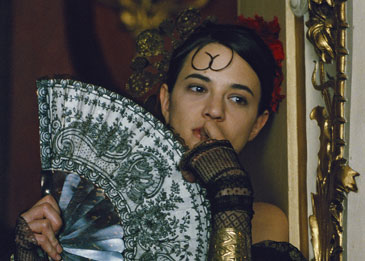
One of the more piquant stills of Vellini (Asia Argento)
I recommend this movie as a kind of introduction to the fiction of the early 19th century in France. I’m sure it’s much changed and given a more upbeat presentation. It is also a film by a woman: written and directed by Catherine Breillat and I suggest is meant to show us an intensely aggressive highly sexualized and masculinized Vellini—Vellini smokes cigars, she is violent continually (slashes faces, is a second at a duel), chases the male who shows some the feminine aspects of Dandyism—if you think want to use “feminine” in a stereotyped manner to mean soft, inward, susceptible, emotional and very pretty.
Two good books: Ellen Moers’s The Dandy and Margaret Cohen’s The Sentimental Education of the Novel in France. Cohen describes books of the 1820s, only she does go for the women’s which were far chaster. Cotten rerences Austen more than once as the closest the English came to the subtlety and inhouse feel of the emotions. The English though did close off the area of frank sex and that made the novels have to move into large historical areas and they imitated the Fielding/Scott line for the broad canvass to substitute rather than say Richardson. LaClos, Radcliffe/Austen/Smith (who herself began as a translator of French novels).
When English authors have their characters reading French novels, they are not just thinking of Balzac or Sand whose novels we may call “high end” fiction.
************
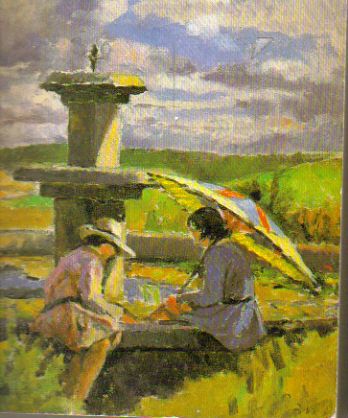
Girls by a Fountain by Mainie Jellett, cover illustration for Virago edition of Jenny Wren (1932) by E. H. Young (1880-1949)
E[mily] H[ilda] Young’s Jenny Wren is an effective thorough going but nonetheless quite recognizable rewrite of Austen’s Sense and Sensibility in modern terms. You have the two sisters and the mother. In this case the mother is lower class and the father married out of his class and was cut off and ostracized. While he was away in the war, the mother had an affair with someone; this was a relief to her as her husband still looked down on her, and their lives were isolated and to her dull; when the husband came home, he half-realized how barren his life with his wife was an turned to the daughters. He dies and the man she has had an affair with loans her money to buy a boarding house and set up lodgings. This enables her to escape the country for Bristol. But she “owes” him and bad and he wants to marry her now and she doesn’t want marriage or him any more. The two daughters have natures which somewhat correspond to Marianne and Elinor, with Jenny the thoughtful and more cultured one who yearns to be part of the upper class, and Dahliah, the pretty and wilder one who is willing to “come down” and enjoy herself. Their natures are complicated. So we have the women in a sort of cottage at the fringes of Bristol. Lodgers come gradually and one is the equivalent of Edward, even a curate, and the sequel to this novel is called The curates’ wife, so again Young goes further than Austen in realistic sex life.
There is a Willoughby character! A Mr Cyril Merriman who is much more upper class than our two heroines, and whom Jenny (the Elinor character) meets out in the meadows just outside the “city-like” limits of Bristol (Upper Radstowe it’s called in the novel), and while she doesn’t fall and he carry her, he does rescue her, and the whole sequence is beautifully romantic. This Willoughby tells the truth about his previous lack of interest in books (as does the Willoughby in the 1971 S&S) and it’s obvious from the get-go our Jenny hasn’t got a chance with him. A modest serious or melancholy intelligent man who is in the antique furniture business Mr Cummings is the Colonel Brandon character: Dahlia, the Marianne character is slowly and very slowly it is being drawn to him.
There is a harsh older woman, Aunt Sarah, the mother’s pushy arrogant sister, who thinks she is all upper class refinement but is a torment to everyone with her continual machinations towards power and control.
Young creates a sense of social milieu and pyschological reality that is more nuanced than Austen’s or nuanced in a satisfying different way and yet comments on the previous book too, its themes about displaced women, economic marginalizing, sexual frustrations, social comedy & satire on types of people (there are lodging houses to one side of the women).
The name Jenny Wren is an allusion to a crippled half-crazed character in Dickens’s Our Mutual Friend. She is a poignant, if tart, little [growth-stunted], a seamstress-designer of doll’s clothing. She cares for/parents a disgraceful alcoholic father [Dickens is big on missing or deceased mothers], who dredges the bodies of suicides [perhaps some murder victims as well] from the Thanes, relieves them of any valuables, then turns them in to the coroner – a dreadful man. As Austen’s characters, so these women are displaced. They are crippled by the social attitudes towards them, in danger of utter marginalization, not just the half-way house they have (like the Dashwoods at Barton cottage). I found Jenny Wren in the film heart-breaking partly because she is so justifiably angry and explodes at her alcoholic father the way she does, and then is left alone—but for our heroine! —when he dies. Ultimately Jenny Wren is a character in a nursery rhyme:
‘Twas once upon a time, when Jenny Wren was young,
So daintily she danced and so prettily she sung,
Robin Redbreast lost his heart, for he was a gallant bird.
So he doffed his hat to Jenny Wren, requesting to be heard.
“Oh, dearest Jenny Wren, if you will but be mine,
You shall feed on cherry pie and drink new currant wine,
Paul MacCartney picked up the fable character for one of his songs:
Like so many girls, Jenny Wren could sing,
But a broken heart, took her song away,
Like the other girls, Jenny Wren took wing,
She could see the world, and its foolish ways,
How, we, spend our days, casting, love aside,
Losing, sight of life, day, by, day,
She saw poverty, breaking up her home,
Wounded warriors, took her song away,
[repeat chorus],
But the day will come, Jenny Wren will sing,
When this broken world, mends its foolish ways,
Then we, spend our days, catching up on life,
All be-cause of you, Jenny Wren,
You saw who we are, Jenny Wren.
I find comfort in Jenny Wren as it shows the isolated women and how in our world people live in little groups like those in Austen’s fiction, at least this level of person in the 1920s or so. Its sequel, Young’s The Curate’s Wife explores the real lives of women in the era: 1930s – 40s, and especially the mix of unhappiness and alienation that makes up daily life in a community and marriages for women, how they experience the world ultimately through that.
There is a good book on E. H. Young and books like hers: Domestic Modernism, The Inter-war Novel and EH Young by Chiara Briganti and Kathy Mezei. The territory of the home was where women lived and through what they experienced in the home and local spaces around it, private ones, they found metaphors for their experience of the 20th century. This is an alternative serious vision for the high modernism men mostly wrote as the male way of grappling centrally with the issues of our time. Yes the writers are middle class women and the books are for middle class women, but the issues include poverty, the problem of independence, of getting a job (to support that house), commercialization of culture as well as the central erotic and familial interactions women find thrust on them as what they are centrally given to know and cope with.
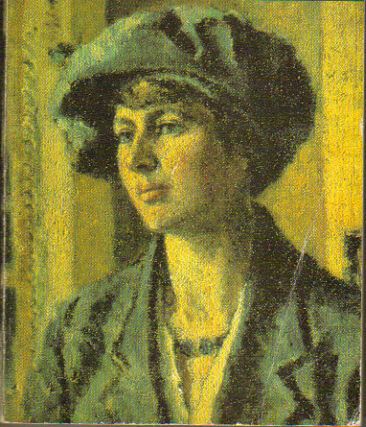
Mainie Jellet portrait on the cover of the Virago edition of Young’s 1934 Curate’s Wife
I have yet to discuss the great books I read this summer: Christa Wolf’s Cassandra, Gaskell’s Wives and Daughters and Stella Tillyard’s Aristocrats, but I had better leave off for now as I’ve gone on long enough. Another time I’ll get up the ambition and energy for these brilliant beautiful filled with life experiences.
Ellen
P.S. I include a several paragraph commentary on Truly, Madly, Deeply, and there are quite a number of thoughtful comments on TMD there. I couldn’t put it in the blog as I watched it a few days after writing it so just added everything on in the comments.
--
Posted by: Ellen
* * *
Comment
- P.S. It must admitted Une Vieille Maitresse does not pass the Bechdel test; however, The Edge of Heaven does and with flying colors.
I've written about how superb Sandy Welch's mini-series film adaptation of Dickens's Our Mutual Friend is on this blog. Just go to the search engine and type in Welch or Our Mutual Friend
E.M.
— Elinor Jul 28, 9:01am # - From Fran on Fatih Akin
“the Turkish/German director you recall from our earlier discussion of his film, ‘Head-On’/’Gegen die Wand’ and entitled ‘Auf der anderen Seite’. It goes under various different English titles, but I prefer the literal translation, ‘On the Other Side’ to the alternate ‘The Edge of Heaven’ as being far less restrictive in meaning and so more encompassing of the many different, but associated, themes in the film: geographical, political and emotional borders, diasporic tensions, physical and spiritual kinship, loss and search for identity, death and its aftermath, guilt and forgiveness etc. etc., all told through the impact of the apparently unrelated, randomly violent deaths of an older Turkish and younger German woman.
Akin’s succumbed a little too much to the Kieslowski and Altman bug when it comes to the episodic, non-linear narration of the story – that doesn’t work as well as in the hands of the masters – but he draws some really fine performances from the ensemble cast. This includes a fine Hannah Schygulla, Fassbinder’s old muse, and Beki Davrak, who plays a gently understated, yet finely nuanced role as the civilized, yet troubled man, trying to do the decent thing in a situation not of his own making, but which has redefined his life.
This is in stark contrast with other males in the film – the one old; the other very young, whose thoughtless, knee-jerk violence towards women leads to their unmotivated deaths.
Here’s a link to a much better review of the film, but there are far more spoilers and unfortunately no pictures of Beki Davrak, who makes a quietly attractive Turkish preux chevalier:)
http://www.signandsight.com/features/1579.html
(http://www.signandsight.com/features/1579.html)"
— Elinor Jul 28, 4:36pm # - From Elissa:
“Dear Ellen,
Amazingly, I just reserved The Last Mistress at our library. Perhaps my community is different, but all those bbc series and even years of old tv shows – everything from Sid Ceasar to The Honeymooners to Mavrick to Little House on the Prairie – are available at our library on dvd. And that is why I mentioned the Turner Network Forsyte Saga to you as I thought you could reserve it at a local or univ. library. It never occurred to me that people buy dvd’s and retain them in a collection as one does books! I guess I’m rather “behind the times” in that respect. But, as the owner of rooms full of books and many other possessions, I’ve become tired of accumulating stuff. So it’s the library for us.
So glad you liked Volver; I enjoyed reading your blog about it. And it is interesting what you say about women oriented/women-directed movies being “dissed” by male critics or at least discounted. I recently saw La Faute a Fidel/Blame It On Fidel! – a charming and touching farce: the reviews of it, esp. by Stephen Holden at the NY Times were revoltingly condescending [modern sense, not Mr. Collins’ meaning]; I am certain if Bertollucci had made it, the review would have been a rave. It made me think that women directors today face a similiar critical and thus economic situation that women writers faced in Austen’s time: “well, the little lady may be quite good at what she does, but of course what she does is only second tier anyway.” So, although women writers have finally staked their claim by the second half of the twentieth century, women filmmakers clearly have a way to go. Penelope Cruz, Emma Thompson, Selma Hyack, Julie Taymor, and, yes Patricia Rozema [but NOT that Coppola woman] are most talented, and I think we will see better recognition of them in the coming years.
And Ellen, I think you will enjoy Paradise Road very much.
Best wishes, Elissa”
— Elinor Jul 28, 8:52pm # - I should add that in the last day and one half I’ve read another novel with great intensity, straight through to the end: Alexander Baron’s The Wine of Eta (published in the US as There’s No Home). An honest humane & powerful slender novel.
E.M
— Elinor Jul 29, 2:04pm # - From Francoise:
“Dear Ellen and All,
Maybe this is due to my sometimes not too good grasping of the English language, but I get the impression that Ellen’s mails both to the Jane Austen List and to WWTA were putting Barbey d’Aurevilly as a fiction writer of the beginning of the XIXth century. He is not. Jules Barbry d’Aurevilly belongs to the second half of the XIXth century and to the decadent movement.
I think Austen would have strongly disappproved of him. Like Maupassant, who was a contemporary, he was from Normandy and lived mostly as a recluse when he was writing there. Ellen is right in saying that he was a dandy. Ha was also reactionnary in French political terms of that time and sulfurous in his denouncing of Catholicism and the Church because this went often along with some appeal to satanism. Thus he was not admitted in the progressive circles but could not link easily with the power in place and the more royalist circles.
Don’t forget the French have been put under the 1789 Revolution trauma and the violent upsetting of their civilisation. The aristocracy fought during the whole XIXth century and until WWI to regain power. There was hardly place for nostalgia for a golden age: it was a very fierce battle with factions and alliances done and undone. We romanticize today but it was different at the time.
Barbey wrote novels all very short – nothing to do with the heavy three-deckers known in Britain at that time or even the length used by Flaubert or Zola. He wrote short stories as well. Most are set in Normandy. He is close to Maupassant in those ways too.
The film “Une vieille maîtresse” received rather a good critic when it went out in France. Breillat hes tried to rehabilitate Barbey but she has interwoven her own particular themes and obsessions in the whole fabric. This gives a somewhat ambiguous reading of the novel. As Barbey was very much a man and Breillar is very much a woman in their apprehension of the world, their are clashes between them. I expect I do not have to spell out that Breillat enjoys a similar sulfurous reputation in France for her eroticism which has already crossed borders with pornography.
Breillat’s film came at the right moment for an audience as it has been two years the French State channel Antenne 2 has produced and shown whole series of Maupassant’s short stories which attracted a very large audience. Settings, costumes, actors, movie directors, all has been perfectly chosen and there is a vivid critic of Maupassant’s society or the society of his time going from the faerm labourer to the rich farmer, the little towns middle-classes, the civil servants in Paris, the middle-classes from the first ring of the social ladder till the the highest to the different branches of the aristocracy. But one can also find a depiction of human nature which is not shown at its best and still very present today.
Breillat’s film is different from this series but she has enoyed an audience who thought they would find an equivalent on the big screeen, when they did not know who she is beforehand.
If people can spare time for men’s books, I would recommend a reading of Maupassant and Barbey d’Aurevilly side by side and a volume of Flaubert who was their master. You will find in Barbey a blend of realism and fantastic which appears in some of Maupassant’s short stories such as “Le Horla”. Flaubert, meanwhile, stands with his two feet on the ground – apparently. Go to his short stories as well and you may be surprised by the difference with the well-known novels.
As I have already said here, there is little place for costume dramas in contemporary France. We read “classics”, but we do not translate them into moving pictures for the cinema or TV. This does not belong to our culture. We make a separation between what is to be read and what is to be seen, probably because we are snobs and think that translating one medium into another – when it comes to great fiction, at least, – is depleting it of something intrinsec (I don’t know whether the word exists in English, sorry if does not).
I agree with this. All these exchanges I have seen here or elsewhere about films reinforce my opinion that there is a direct contact between the author and the reader. When the text is read by a movie director and his/her staff and scenarists, etc., there is a reading which comes between me as audience and the author and I see what the director has wanted me to see not what the author wanted me to read. You will say that it may be an enrichment of the reading because it shows a or many new ways. It is certainly true. But the French student was ( he is no more now unless he/she belongs to intellectual classes) encouraged to see the original and read the text, not the glose around. We always turned to the sources, not the interpretations. The interpretations (translations for instance) came after, to be criticised either positively or dismissively. As to the movies or TV series, they still smell sulfur for intellectuals when they deal with our fiction master pieces.
I agree: this point of view is demanding, exacting and elitist. But it gives a discipline and an intellectual rigour. It does not eradicate the glose, be this being through the medium of filmic adaptation, but it takes it for what it is: one reading of the text only and sometimes a totally wrong one or an oriented one which may lead those who do not have access to the original to false conclusions. We know this use led to propaganda earlier…
All best to All.
Françoise”
— Elinor Jul 30, 11:15pm # - Dear Francoise,
Thank you very much for the correction and comments. I see I did locate D’Aurevilly too early in the century. I think that’s because I read about him in Ellen Moers’ book on the dandy and that made me see him as a regency type; I looked on Wikipedia (right now it’s nighttime and I can’t get to my French books as I’ll disturb Jim) and see while he was born in 1808 and wrote a couple of stories in the 1830s, most of his writing is later and goes into the second half of the century, and Une Vieille Maitress is 1851.
I felt it was strongly probable Breillat had reshaped the novel. I couldn’t tell if hers was an apparently faithful type (transposition it’s called) or a commentary, and would have wanted to know how her being a woman switched the story. As I wrote I thought she made Vellini into a masculine woman, aggressive, cigar smoking, determined, revelling in violence where Ryny comes out a feminine man, filled with intense sensibility. (I’m using these stereotyped terms because they fit the film and presumably the fiction too).
As I’ve written before I enjoy the films in their own right and see them as works of art in their own right—rather like Poggioli writes, they look into nature through the mirrors of art while the original work looks into nature through the mirrors of life. It’s not just as an interpretation of Austen or D’Aurevilly or whoever I watch them, but as making statements of their own in a medium as potentially complex as that of verbal art. We just have to learn to read all the filmic levels and films are in fact overabundant with information, only they deliver it differently.
I have read Maupassant and some Flaubert. The Maupasant I read has intense extravagances, but the Flaubert I’ve read is all controlled (Madame Bovary, Julien) so I would not have connected him to this kind of flamboyance.
Ellen
— Elinor Jul 30, 11:27pm # - This is not an adaptation of a Victorian or Edwardian text; it is not connected to Austen (she is never mentioned nor any of her books), but it is a ghost story, which type of text I've discussed on this blog and my website before, and its center are two great actors: Juliet Stevenson (Antigone, Mrs Elton, Nora Helmer of A Doll's House) and Alan Rickman, a superb actor (Colonel Brandon, and in Barchester Chronicles as an embodiment of an intensely ambitious and humiliated Obadiah Slope. Directed and written by Anthony Minghello who did the film adaptation of the great English Patient, the script was superb and direction inventive.
I watched it last night and was very moved by it—saddened, really saddened. It developed in an unexpected way, and I don’t think I quite realized it’s a ghost story. Most ghost stories are not benign: they are about evil, guilt, justice; the ghost is mischievous, enigmatically malign; it’s a Kafka universe, and about the irretrievability of deeds and death. Dickens’s famous Christmas Carol is an exception; Gaskell has another exception in another Xmas ghost story: “Lady Mary,” though in hers if the ghost, Lady Mary, is benign she cannot retrieve and redeem what has happened before her death. Truly, Madly, Deeply was like most ghost stories nowadays though in being ambiguous: it could be the ghost is a projection, a way Nina (Juliet Stevenson) works through her grief, but we are meant to feel the ghost was really there. That’s important.
Jamie (Alan Rickman, still thin the way he was in Barchester Chronicles and so handsome) comes to succor Nina, to comfort her, and one could interpret the ending by saying he has gotten her to accept his death, and in fact no longer want him around because he’s dead but prefer a living man, a living baby (her friend’s experience of childbirth is symbolic in the film). But I fetl he was also there for himself, and very much wanted her to want him there. We pick up slowly that in fact their relationship was not ideal at all; she was dependent (could not do anything on her own, like fix her flat, hire workmen); she didn’t do a lot she wanted because he didn’t approve or didn’t like whatever it was. But it was deep, mad, true love and he has come back for it. The minor characters were well done: David Ryall as the raspish George added just the right astringent note.
What was unexpected was the ghost gave in, gave up, went away.
Maybe it was that that made it so sad. I don’t know but the ending when he is waving with all the ghost friends to her and she doesn’t turn round and he is going back to wherever death is was so poignant. I thought it does relate to Persuasion (though is not an adaptation and does not have Austen in mind at all) like Lake House. We cannot beat death and time. But it’s more than that; it seems to be about desires, and how movies can be dreams which picture what we desire, each of us individually, but cannot for whatever reason in our individual lives have. We experience it as a voyeur, vicariously, but like Jamie, the ghost, it’s not satisfying, it’s unreal no matter how deeply gratifying in the experience. And so hollow the way a disappearing ghost is (for Jamie does disappear a couple of times, is a trickster too).
I should have known it would be very sad and deep. The word "charming" was used to describe it in the blurb. It's the going improbable euphemism. Is not popular culture strange? People choose a word that suggests the opposite meaning of what is in the case of what they want to hide.
Ellen
— Elinor Aug 1, 7:26am # - I just finished an excellent book: Vijay Mishra’s Bollywood Cinema: Temples of Desire. On one level, he teaches you how to “read” a movie, and I’m delighted with his defense of deep analysis of shot stills and segments, patterns of mise-en-scenes, folk types, the actors themselves as parallel texts (so if you want to understand Elizabeth Bennet in the 95 P&P you watch films with Jennifer Ehle and see where this one fits in in her “film biography life”); on another, he analyses the diaspora and how Indian films function today in India and in diasporic groups, both globally and locally. There’s an intelligent analysis of how far we can apply “auteur” ideas about films and how to compromise taking into account all the different individuals, arts, and motives in a film. He is both a feminist as part of a progressive humanist stance (deeply and well thought out) and a ost-colonialist. The book is marred by too abstract language, butthen he says a lot. He’s helped me understand Bride and Prejudice particularly.
E.M. continuing the record of her reading books straight through that are enjoyable and instructive.
— Elinor Aug 1, 3:30pm # - From Sheila:
“Hello Ellen,
How lovely to read your comments on one of my all time favorite films. I have watched it many times and out of desperation have asked my library to obtain it for the collection so I can view it many more times. They have a copy of the screenplay, which is very interesting as it includes comments from Anthony Minghella and explains his choices for certain scenes. The soundtrack is filled with Bach and that just adds to my pleasure.
Unfortunately, in a case of life imitating art Mr. Minghella passed away suddenly this March after surgery for a tumor on his tonsils (I think I remember it correctly) which resulted in a post op hemorrhage. Jamie dies after a tonsillectomy and probably a hemorrhage, a not uncommon event in adults.
Thank you for all your essays on the Austen films and tv adaptations. Since I will never get to see all of them I appreciate your sharing the information.
Sheila Ober-Brown”
— Elinor Aug 2, 5:36am # - From Kathy:
“And I’m glad you loved Madly, Truly, Deeply. I watched this several years ago and thought it very sad. On a more popular culture level, there’s Ghost. Have you seen it?”
In reply:
I've not seen it, but I looked it up and discovered it's similar thematically and in character types: Patrick Swayze, a ghost, comes back to warn his wife, Demi Moore, an artist, that she is in danger. She doesn't hear him. Whoopie Goldberg won an Oscar for this movie. Apparently it has "the same quick American feeling." Both movies are sad: Ghost has some comic relief, as well as immense sadness over the loss of a husband.
In Oliphant's "Lady Mary" the ghost cannot get in touch with her niece; neither can she changed her will. When alive, she wrote a second will which did give her niece money; the first did not and she would hold it over the girl's head to make her obey (by showing her indifference to her). Now she regrets all this, regrets she was not loving to the girl. But it's too late. I've always thought this story an answer to Dickens's A Christmas Carol.
Thank you so much for your comment, Kathy. American films can have this sudden pull of intense emotions from deep in the gut and it's open as it is rarely in other cultures. Our deeper thoughts and feelings are nearer the surface or we let them out quicker.
E.M.
— Elinor Aug 2, 5:39am # - Dear Sheila,
Thank you so much for your comment. I think it kind and friendly and yearn for comments :)
I do agree on tonsillectomy and there think it should be much more widely advertised how dangerous these operations are.
I hope you are enjoying the lists you are on with me.
Ellen
— Elinor Aug 2, 10:57am # - From Marilyn Marshall on Truly, Madly, Deeply:
“There’s an element here of here overwhelming grief not allowing him to completely die. As long as she clung to him he was held close to the living and her grief literally calls him back from whatever middle land he was inhabiting. It appears that the stage of death that she called him back from didn’t allow him to be himself—a musician, a lover, or capable of fully enjoying life—without her presence and stimulation. In fact, when she wasn’t around he could only stare at the television with other sorry in-between souls. It was in his best interest to see her begin a new life so that he could finish the business of dying.
This undercurrent is in Lake House, as well as Persuasion. So much depends on the agency of the woman—she must set wheels in motion to retrieve the man from the brink of the unknown. Her lack of understanding about what is happening and what she needs to do is her greatest obstacle, but she perseveres. In TMD she has the extra job of giving him the boost he needs to leave the living world.
I read somewhere (or maybe it is in one of the extras on the DVD) that the psychiatrist office scenes were shot in Bristol. Minghella drove Stevenson there and on the ride she rehearsed, which meant heavy sobbing and agony as he tried to manage the traffic. I can’t imagine wringing yourself out like that and then an hour later doing it again—but then that’s why I’m not an actor!
Incidentally, my most recent Netflix rental was Snow Cake, an unreleased 2006 film starring Alan Rickman and Sigourney Weaver. Very good performances by both of them in a kind of oddball film. He always manages to inject dignity and sincerity into whatever role he’s in.
Marilyn”
— Elinor Aug 3, 5:44am # - Thank you for the thoughtful comment, Marilyn.
As I thought about the film, it seemed to me the intense sadness I felt came from the man giving in, giving up, going away and it was that that was so sad. The irretrievability of death.
So I am “reading” the movie somewhat differently from the way you are. I felt a real pull towards death in the film—as I feel there is one in Persuasion, the deep melancholy undercurrents of the book mix here, as it does with its treatment of loss as a treasure, the beauty of older love and thus aging when dignified and accepting it, of autumnal beauty, of Lyme. There’s also a current of necrophilia in the film—for me part of its poignance and strangeness.
I feel the film text also wanted him to stay and he was the agent you see, he the force that turned her around as she decided she didn’t want to spend her life with a dead man. At one point, Jamie, Nina and the ghost friends are watching the concluding scene of Brief Encounter, a rare moment in the film where the husband is seen. As I recall, he (in effect) acknowledges she has been away from him, but forgives her and says how he needs her. She acquiesces in staying but not because she loves or wants him.
Some of the imagery was daring: the use of mentally retarded people for example made the new lover into a compassionate man, but also someone drawn to loss, partial life, and sheer love of beings (including in the movie thus the dead) no matter what they are missing. The pain of childbirth was insisted upon, emotional and physical pain itself.
Again, in Dickens’s “Christmas Carol” as we all recall death is not irretrievable and the old man redeems his whole life, the ghost being purely benign. In Persuasion and Christmas Carol it’s not too late. They get a second chance. In Oliphant’s Christmas story, "Lady Mary's Story," it's too late. In Lake House, Truly, Madly, Deeply, Ghost it’s also too late and in all these cases the death is a death of deep love or a love never had.
It’s very rare the Gods give us a second chance, eh Marilyn?
I agree on the depth and dignity Rickman brings to a role; he transformed Obadiah Slope in Anthony Trollope’s Barchester Towers brilliantly by his intensity, and thus when I reread the book, the character is enriched for me, for yet Rickman was true to the character too.
Ellen
— Elinor Aug 3, 6:00am # - From Kathleen McCormack:
>Someone who read my blog suggested that Ghost with Whoopie Goldberg is an analogous but more popular rendition of these themes.<
“When Truly Madly Deeply first came out, I heard it referred to as “the thinking person’s Ghost”. Truly Madly, Deeply is one of my top 20 favorite movies.”
— Elinor Aug 5, 6:37am # - TMD is one of my favorite films—it is the first film I got to the end of and immediately rewound and watched again. And again. Seeing more each time. No other film has so stirred my emotions. As you say, the irretrievability of death. Brought home by believing for this short space of time that it might not be true after all.
There was so much that was unexpectedly genuine and sweet in their (Jamie & Nina’s) relationship. And all the quirky touches, like the hopping. Between the writing and the performances and most of all the Bach soundtrack . . . just a masterpiece. And Minghella much mourned.
Barbara
— Barbara Aug 6, 4:34pm #
commenting closed for this article


